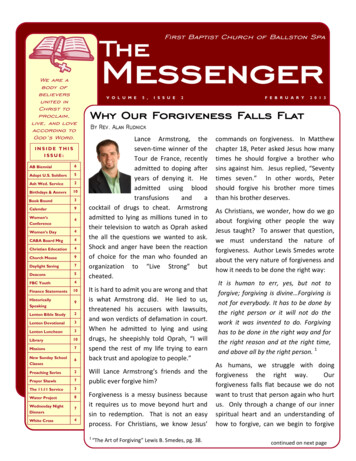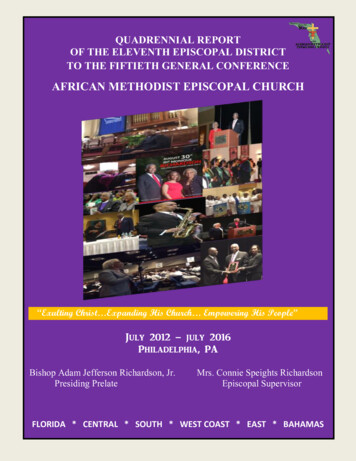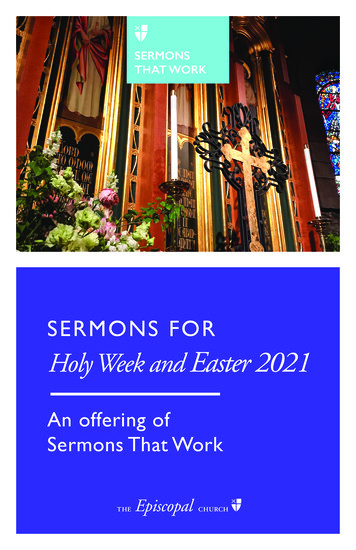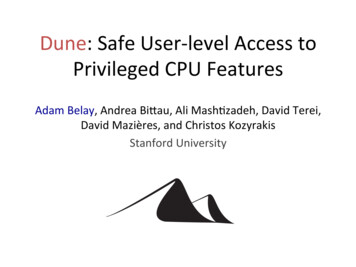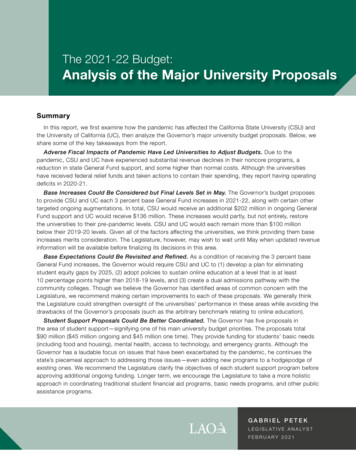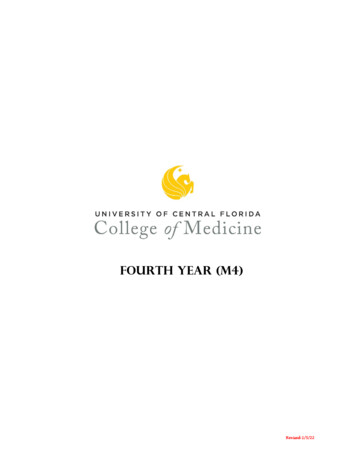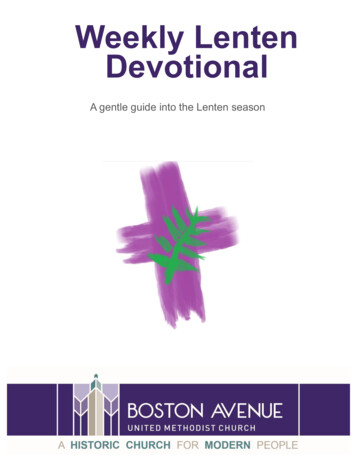
Transcription
2022LENTENMEDITATIONS1
Dear fellow travelers on the Way of Love,We have arrived once again at this very holy time. The Lenten season is when we takestock of ourselves, from our sins to the many examples of God’s grace in our lives.Because we are members of the Body of Christ, we discover these examples of gracethrough encounters with others—our family, friends, neighbors and all those who showGod’s liberating and life-giving Love to us.As Presiding Bishop Michael Curry reminds us, we can recognize God’s Way of Love inunselfish, sacrificial and unconditional acts. At Episcopal Relief & Development, we areblessed to witness these acts in our partners’ unconditional and sacrificial work across theglobe. Our partners work to ensure that women live free from violence and are treated withdignity and respect. They help caregivers and community members support children toreach appropriate health and developmental milestones. They help community memberswork together to prepare for, adapt to and reduce risk from increasingly changing weatherpatterns. They help communities prepare for disasters, and they provide emergency helpso that vulnerable groups can make full and sustained recoveries after disasters.These acts of Love are signs of God’s loving grace to us every single day. As you enterdeeply into this holy Lent, we invite you to reflect on the unselfish and sacrificial works ofour partners around the globe by reading the meditations of those who have witnessedthis work firsthand. As you read, we invite you to reflect on similar acts you havewitnessed as you walk the Way of Love. Where have you seen people reflect God’sliberating and life-giving Love in your life and your community? Allow these meditationsand your own reflections to bring you peace and hope and serve as a reminder that, in theend, Love wins.Wishing you peace.Sean McConnellSenior Director, EngagementEpiscopal Relief & Development 2021 Episcopal Relief & Development. All rights reserved. Printed in partnership with Forward Movement.2
ASH WEDNESDAY, MARCH 2Yet even now, says the Lord, return to me with all your heart.*—Joel 2:12The Prophet Joel writes to us during a time of natural disaster. A plague of locusts hasinvaded the land, crops have failed, fire has “devoured the pasture of the wilderness” andthe waters have dried up.Yet in the midst of it all, God invites the people to return. Even when disaster followsdisaster, when it is hard to find hope, the invitation stands: We can bring our heavy heartsto God.Thanks to the work of Episcopal Relief & Development, Episcopalians can also cometogether during times of disaster and despair. Knowing that God is with us, we can pray,ask for God’s help, and mobilize to provide for God’s people.Today, as we are called to the observance of a holy Lent, may we remember that Godinvites us to return again and again, heavy hearts and all.The Rev. Gay Clark Jennings, President of theHouse of Deputies of The Episcopal Church, onpilgrimage with Episcopal Relief & Developmentto visit the Early Childhood Developmentprogram run by the Zambian Anglican CouncilOutreach Program (ZACOP, 2019).* Unless indicated, scripture quotations are taken from theNew Revised Standard Version Bible, copyright 1989 bythe Division of Christian Education of the National Councilof Churches of Christ in the USA and used by permission.3ASH WEDNESDAYWhen Joel hears this assurance of God’s faithfulness, he gathers the people. With a blastof the trumpet, he calls young and old to come together as one, to pray, and to ask forGod’s help.
Our work with Women focuses on helping communities promote the rights of womenand children and move toward the vision that everyone deserves a life free from violencein a society where they are treated with dignity and respect. Only then can communitiestruly heal and thrive.The author of ourmeditations on Womenis Lindsay CoatesLindsay Coates is a nonprofit executive witha legal background in civil rights, bringingtogether her passion for human rights, thesocial sector and global development. Sheis active as a speaker and writer on a rangeof topics around equity and inclusion. Inwriting these meditations, she relied onthe advice and insight of former EpiscopalRelief & Development Board member, theRev. Genevieve Razim.Coates meets with BRAC Ultra-Poor GraduationInitiative participants in Northern Bangladeshin 2018.WOMENUntil recently, Coates was Managing Director of the BRAC Global Ultra-Poor GraduationInitiative where she led the advocacy agenda to leave no one behind through effective,innovative and multi-dimensional solutions. She was also responsible for learning andtechnical assistance activities in over ten countries in Africa and South Asia. Beforejoining BRAC, Coates served as the President of InterAction, a coalition of NGOs workingto address poverty and injustice. Coates has served on the steering committee of theWorld Bank Global Partnership for Social Accountability and the Partnership for EconomicInclusion, the Executive Committee for Modernizing Foreign Assistance Network, and theboards of Episcopal Relief & Development, United States Global Leadership Coalition andDevelopment Gateway. She also served on the Obama administration’s Task Force onGlobal Poverty.Prior to her work in the nonprofit sector, Coates practiced civil rights law in variouscapacities including beginning her law practice in Mississippi. She is a graduate of theUniversity of the South (Sewanee) and the University of Mississippi School of Law.4
THURSDAY, MARCH 3Our goal is to create a beloved community and this will require a qualitative change in oursouls as well as a quantitative change in our lives.—Martin Luther King Jr.“Nonviolence: The Only Road to Freedom”I take heart from the admonition of the Rev. Dr. Martin Luther King Jr. to build the belovedcommunity, a community in which everyone is cared for, absent of poverty, hunger andhate. To do this, we must do both the work we can see in the world and the work wecannot see through the senses—that “qualitative change in our souls and in our lives.”Through his lifetime of activism, King popularized the term and ideal of the belovedcommunity. Many are fueled by faith that such a community is possible. However, withinthat call, my mind often jumps to racial reconciliation and healing across boundariesof color and ethnicity, language and custom. In taking that leap, even someone whocalls herself a feminist passes over how women are excluded and must be intentionallybrought into the beloved community. Why is that so? Perhaps it’s because patriarchy isso ingrained that even I, who rail against it, can miss it.5WOMENToday, and for the next several days, I invite you to pause with me and reflect on howgender bias and discrimination hold us back from realizing the full and beloved communityof God’s people.
FRIDAY, MARCH 4And those who ate were about five thousand men, besides women and children.—Matthew 14:21UN Women reports that the COVID-19 crisis is reversing generations of progress for allpeople in poverty. Episcopal Relief & Development has found in its work that the pandemichas disproportionately impacted women, specifically in areas of health, caregiving,employment, poverty and domestic violence. Before the pandemic, the poverty rate forwomen was expected to decrease by 2.7% between 2019 and 2021. Projections nowpoint to an increase of 9.1%. If we are to build the beloved community, we must focus onwomen.What does it mean to focus on women? First, women must be seen and counted. In thefeeding of the five thousand in Matthew’s Gospel, we are told that five thousand men werefed, “besides women and children,” who were not counted. If there were family groups,one might assume that women and children offered an equal number of hungry followersof Jesus. Are we counting the women? Is our work to build a beloved community focusedon them?WOMEN6
SATURDAY, MARCH 5Just then, a Canaanite woman from that region came out and started shouting, “Have mercyon me, Lord, Son of David; my daughter is tormented by a demon.” But he did not answer herat all. And his disciples came and urged him, saying, “Send her away, for she keeps shoutingafter us.” He answered, “I was sent only to the lost sheep of the house of Israel.” But shecame and knelt before him, saying, “Lord, help me.” He answered, “It is not fair to take thechildren’s food and throw it to the dogs.” She said, “Yes, Lord, yet even the dogs eat thecrumbs that fall from their masters’ table.” Then Jesus answered her, “Woman, great is yourfaith! Let it be done for you as you wish.” And her daughter was healed instantly.—Matthew 15:22-28We must also be open to seeing the women we may not want to see. As a crowd issurging around Jesus, an annoying foreign woman calls out for the Lord’s attention inthis story. Her actions and behavior are out of bounds. The disciples urge Jesus to sendher away. But the woman is desperate, her need for her demon-possessed child is urgent,and she is undeterred by public embarrassment. Like the disciples, Christ diminishes her,likening her to a dog. Nevertheless, she persists.7WOMENAs a young budding feminist, I saw this as a story about the superior spiritual tenacityof women—but that is in itself incomplete and sexist. I see now the relentlessness andintensity of women desiring a better life, whether others find them annoying or out ofplace. Our efforts to build the beloved community are best served when we focus ontenacious women who do not wait for our approval.
MONDAY, MARCH 7Now, as they went on their way, he entered a certain village, where a woman named Marthawelcomed him into her home. She had a sister named Mary, who sat at the Lord’s feetand listened to what he was saying. But Martha was distracted by her many tasks; so shecame to him and asked, “Lord, do you not care that my sister has left me to do all the workby myself? Tell her then to help me.” But the Lord answered her, “Martha, Martha, you areworried and distracted by many things; there is need of only one thing. Mary has chosen thebetter part, which will not be taken away from her.”—Luke 10:38-42This familiar story is often read as creating a dichotomy between two types of people –“the Marthas” and “the Marys.” But I have come to see Martha and Mary as two sides ofthe same coin. All women work, often with the same urgency and purpose as Justa (theCanaanite woman we read about yesterday) showed as she sought help for her daughter.WOMENThe busy Martha reminds me of another Martha encountered while on an Episcopal Relief& Development trip to Colombia. One day, we traveled by bus to the countryside to seethe programs working with farmers, particularly women. The roads were rough; we askedtoo many questions, and we ran behind schedule. One of our last stops was at a smalland hard-to-access farm. Our leader left us on the bus and checked if the female farmerwe were to visit was ready to receive us. To the group leader’s surprise (and, I think, ourdelight), she made clear that we were late. She had been waiting on us and didn’t havemuch time to talk as she needed to go to the fields and check on her animals before dark.I loved that she had her work and that our approval as her “benefactors” was secondary.This woman was seen and counted by Episcopal Relief & Development. This Martha feltshe should use her own time, in her own way that mattered for her.8
TUESDAY, MARCH 8He has brought down the powerful from their thrones, and lifted up the lowly; he has filledthe hungry with good things, and sent the rich away empty.—Luke 1:52-53While individual stories are essential, any community is a system, a series of interlockingpieces. And some systems exclude and marginalize. Financial markets often fail orexclude women. While we might push and fight to change a system over the longer term,the “now” also demands our urgent attention.Some of the most potent work of Episcopal Relief & Development, which I have seen inLatin America and Africa, are Savings with Education groups. These groups are primarilycomprised of women. Savings groups offer critical financial and business training alongwith small business loans to individuals and groups. The savings groups develop microinsurance products, village banks and cooperatives. Episcopal Relief & Developmentunleashes the latent power of groups excluded from a system and makes it manifest.9WOMENParticipants in these groups get to see themselves as contributors to their community,making them and their community beloved.
WEDNESDAY, MARCH 9He has put my family far from me, and my acquaintances are wholly estranged from me.My relatives and my close friends have failed me.—Job 19:13-14We look away from suffering because it frightens us. We are so accustomed to all theforms of violence against women, we can miss the suffering. War, forced migration, childmarriage, rape, human trafficking, domestic violence, honor killings, denial of food oreducation and economic marginalization all feed into one another and support the cycleof poverty. According to the United Nations, one in three women will suffer some kind ofgender-based violence in her lifetime. We do not want to see, and we look away from athing so close to our experience and so ingrained in our lives.Some of the most powerful work of Episcopal Relief & Development stands in solidarity,looks directly at this pain and works to eliminate it. In partnership with Islamic ReliefUSA, this work engages Christian and Muslim faith leaders in the process of discovery,reflection, discernment, scripture study and prayer. This process opens faith leaders’ eyesto look, as if for the first time, at social phenomena so close they are easily missed.Beloved community moves closer to reality through this transformative work.WOMEN10
THURSDAY, MARCH 10Will you strive for justice and peace among all people, and respect the dignity of everyhuman being?—The Book of Common Prayer, p. 305In 2017, I visited a village in northern Bangladesh to meet participants of a programdesigned to eradicate poverty. Despite barriers of language, culture and experience, I wasmoved and inspired by the women, who had a strong desire to share and connect. Ourconversations were animated. When I asked one woman what had changed in her life,she left suddenly, and I feared I had offended her. Instead, she returned quickly, bringingwith her a small and treasured written invitation to a party given by a more affluent familyin her village. Before going through the program, her neighbors barely knew she existed,she said. Now, she was a recognized member of the community, invited into people’shomes and weddings. In that moment, I understood how poverty isolated her from hercommunity.Respecting the dignity of every human being not only lives into the call of our BaptismalCovenant, but also it transforms lives. Reconciling women within their local communitiesbuilds our beloved community.11WOMENWe often talk about extreme poverty that disproportionately affects women as anabstraction. The reality of living in extreme poverty is not just a lack of income. Millionsof families cannot put food on the table, send their children to school, access basic healthor provide a safe living environment. Too many still resort to child labor or child marriage.Often, these women are disconnected from markets and infrastructure. And increasingnumbers are exposed to the tragic effects of climate change, conflict and displacement.As in the case of the women I met in Bangladesh, these challenges are compounded bya level of social isolation that renders it nearly impossible to overcome the poverty trap.
FRIDAY, MARCH 11Strength and dignity are her clothing, and she laughs at the time to come.—Proverbs 31:25We know that we will not build a beloved community unless we see all the gifts and powerseach human holds. Many of our traditions, though, hold us back. In most places, leaders,including faith leaders, are men. One need only look at our lectionary and traditionalunderstanding of the Bible to see the ingrained minimization of women. Mary Magdalenewas not a prostitute; Mary and Martha are two sides of the same coin and not opposites.Counting and identifying women who may be hidden by shame, marginalization andviolence is both necessary and not enough. Women must be co-creators in building thebeloved community. We must open our eyes to the power of women, ancient and modern.So, Lydia, who was prosperous and a financial backer of the disciples, tells us that we canall do the same today. What am I, as a woman with power and privilege, doing to build upother women and the beloved community?WOMEN12
SATURDAY, MARCH 12There is a river whose streams make glad the city of God, the holy habitation of theMost High.*—Psalm 46:5Serving on the Board of Episcopal Relief & Development was a powerful experience,marrying my deepest feelings as a human with my vocation to fight poverty. So much ofantipoverty work leans toward the technocratic: if we can just find the right vaccine, theright seed, the right method or tool, we will end poverty. All this is good and needed andnot enough. Technocratic fixes are easier for leaders and politicians and governments toaccept. The problems then are about money, time and logistics. Marginalization persistsif we ignore the human sin and failings that feed poverty, violence and injustice.* Psalm passages are from the Psalter in The Book of Common Prayer.13WOMENEpiscopal Relief & Development takes us to another route that is harder but also better. Itsprograms—when they all fall into place—are an alchemy of integrated interventions. Womenwho join savings groups can become leaders in their communities; women survivorsof violence can become advocates and peace builders. Daughters and sons who see amother with a voice in the home and community see different futures for themselves. Thecommunity changes slowly, and it changes in its heart. Hope and abundance are unlocked.When at our best, we can, with our local and interfaith partners, build a net of services andcontacts—human contacts and relationships—that build a beloved community and thekingdom here on earth.
Our work with Children supports and protects kids under age six so they reachappropriate health and developmental milestones. This focus on early developmentis foundational and critical to helping children achieve their full potential as futurecontributing members of their communities.The author of ourmeditations on Children isthe Rev. Abigail W. MoonThe Rev. Abigail (Abi) W. Moon lives inTallahassee, Florida, where she is the InterimRector of St. John’s Episcopal Church.Raised as an “Army brat,” Moon grew upmoving every two to three years. In eachnew location, she discovered a deeperappreciation for people, culture and thedivine. In seminary, Moon discoveredMoon with a student at an Anglican schoolin Bolgatanga, Ghana.Episcopal Relief Relief & Developmentand fell in love with its sustainable anddevelopmental practices. She served asthe seminary liaison to Episcopal Relief & Development from The School of Theologyin Sewanee, Tennessee, and has continued her support of the organization in parishministry.CHILDRENLiving in Florida, she has seen the hard and compassionate work of Episcopal Relief& Development in action with her sister dioceses with the disaster relief offered afterHurricane Michael. She currently serves on the ONE THOUSAND DAYS OF LOVE campaignadvisory committee and has participated in Episcopal Relief & Development’s pilgrimageto Ghana.14
MONDAY, MARCH 14Jesus said, “I say to you that listen, love your enemies, do good to those who hate you,bless those who curse you. Pray for those who abuse you.”—Luke 6:27-28These words are hard to hear in the polarized modern world. Do good, bless and pray forthose who have broken your heart, your body, your soul. When someone had been rude orhurt my feelings as a child, my mother used to tell me, “smother them in kindness.” Whilethis may or may not have been the only way to move forward, this scripture reminds methat loving our enemies means telling the truth, being kind, listening deeply and holdingtheir story in our hands, too. With outstretched hands, we can be healers and bridgebuilders, able to change unjust systems and be transformed.15CHILDRENChildren are the quickest to reach for our hand. Are we equally ready to reach out in love?
TUESDAY, MARCH 15The greatest among you will be your servant. All who exalt themselves will be humbled, andall who humble themselves will be exalted.—Matthew 23:11-12Have you ever taken a moment to stop and really watch what is going on around you, tolook and listen to each person that is working near you or walking by? Have you wonderedfor a moment who is the “greatest” among those around you?Jesus’s words here remind us that the greatest among us is a servant, the one serving theother. We hear the echoes in the words of Fred Rogers, who said, “Look for the helpers.”When we need hope, we should look to those serving.Children are always watching and learning. They are listening to what we say, and theyare watching our actions—actions that often are louder than our words. Children call usout when our words and actions do not say the same message. Children know who thegreatest people are in the community; they see kindness and love and are drawn to it.Episcopal Relief & Development seeks to provide the best environment for childrenthrough health, nutrition, and education—signs of a community caring for its youngest.Take a moment today and stop. Look around you, and take in the servants in your midstthat might have been missed initially. Be like a child and seek that love and kindness.CHILDREN16
WEDNESDAY, MARCH 16Then the mother of the sons of Zebedee came to Jesus with her sons, and kneeling beforehim, she asked a favor of him.— Matthew 20:20A parent’s love is deeper than no other. This passage always makes me chuckle. Ms.Zebedee was just watching out for her boys. She wanted them to succeed, and she wasgoing to do all that it takes. She even has the chutzpah to ask a favor of Jesus.Jesus, of course, replies that she really doesn’t know what she is asking of him or for hersons. But a parent’s love is deeper than no other. Ms. Zebedee, as a mother, is willing toask Jesus for what her heart desires. God, the father, is offering us his deepest desirethat we might be united with God through love and compassion. Jesus’s life is the love ofGod with us and for us. A parent’s hope is that a child might flourish and be a testamentof love.17CHILDRENWhen I see Episcopal Relief & Development’s programs for children’s health in the firstsix years of life, I am reminded that together we can be Ms. Zebedee, fighting for theopportunity for all the children of the world to flourish. What one thing can you do todayto create the space for a child to flourish?
THURSDAY, MARCH 17Christ be with me, Christ within me,Christ behind me, Christ before me,Christ beside me, Christ to win me,Christ to comfort and restore me.Christ beneath me, Christ above me,Christ in quiet, Christ in danger,Christ in hearts of all that love me,Christ in mouth of friend and stranger.—Prayer attributed to Saint PatrickWe live in an uncertain world, and yet, we believe in the certainty of God’s transformativelove. Today is the feast day of Saint Patrick, the patron saint of Ireland.As a child in Great Britain, Patrick was abducted by pirates and then sold into slavery inIreland. Even though he escaped, this experience formed his childhood and his life’s work.In his adult life, he returned to Ireland as a priest and became their bishop. His life’s workwas to provide for the education and formation of those in Ireland.Episcopal Relief & Development works tirelessly to provide education, wellness and healthto the smallest of children, reminding them that they are not alone, that in the midst ofuncertainty there is opportunity for comfort and restoration, change and transformation.In providing these resources, children are given the opportunity to see the change thatthey too can be.CHILDREN18
FRIDAY, MARCH 18Grant, O Lord, that as your Son Jesus Christ prayed for his enemies on the cross, so we mayhave grace to forgive those who wrongfully or scornfully use us, that we ourselves may beable to receive your forgiveness; through Jesus Christ our Lord, who lives and reigns withyou and the Holy Spirit, one God, for ever and ever. Amen.—Holy Women, Holy MenCollect for Friday in the Second Week of Lent*In the Old Testament, we hear about Joseph and his brothers. Joseph was the apple of hisfather’s eye, which made his brothers green with envy. Their envy divided them, and theyremained apart for many years until Joseph showed his brothers how to be in relationshipagain. Now, Joseph was fully human—and he was not an angel by any means—but he didnot let their divisions win in the end.In the northern part of Ghana, a multifaith collaboration through Episcopal Relief &Development provides clean water, sanitation and health education. Members of thecommunity do not let faith divisions get in their way. Rather, they come together tocollaborate so that all might drink clean water together, so that all might be well.*Used by permission from the Domestic and Foreign Mission Society.19CHILDRENWe are all brothers and sisters together in this world. How might we collaborate toeliminate divisions and share our resources with each other for the betterment of ourglobal family?
SATURDAY, MARCH 19“Did you not know that I must be in my Father’s house?” But they did not understand whatJesus said to them. Then he went down with them and came to Nazareth, and was obedientto them. His mother treasured all these things in her heart. And Jesus increased in wisdomand in years, and in divine and human favor.— Luke 2:49b-52As a young child, Jesus found delight in listening, learning and being with God. It’s nowonder that when Mary and Joseph could not find Jesus, he was back in the temple inJerusalem listening and learning. Children are sponges, ready to soak up knowledge andto grow in grace and wisdom.Episcopal Relief & Development strives to assist all children so they may flourish in theirfirst six years of life by providing maternal health programs, clean water and propernutrition. These programs allow children to dance, sing and absorb all that they need togrow up and be who God is calling them to be.When you realize that Jesus felt welcomed into his Father’s house, it is only natural thatJesus would also say “let the little children come to me” later in his own life. How do wewelcome and provide a space for the youngest of these to flourish and thrive?CHILDREN20
MONDAY, MARCH 21As the deer longs for the water-brooks, so longs my soul for you, O God.—Psalm 42:1Ghana is a beautiful country with coastlines in the south, savannah in the northern region,and every climate in between. On the coast, in the larger cities you see Anglican schoolsproviding education for all ages. At times, due to their low-lying elevation, they are floodedby the rains, prohibiting classes. In the north, it is dusty and dry. Water is scarce in thenorth, and the heat pounds down, making you seek shade and water.As a deer longs for the water, our global community longs for refreshing physical waterfor nourishment and sustenance, for cooking and nutrition. They say when you feel thirsty,you are already dehydrated. What do we thirst for in our lives? When will we realize thatwe long not only for water but also for God, for wellness and for wholeness?21CHILDRENWhere can we, in the midst of our varied landscapes, quench our thirst?
TUESDAY, MARCH 22All the paths of the Lord are love and faithfulness to those who keep his covenant andhis testimonies.—Psalm 25:9If there is one thing I have learned in this life thus far, it is that change takes time, andchange takes all of our gifts and talents coming together for the common good. Love andfaithfulness carry us through the challenges and the celebrations. Love and faithfulnessnever quit. Love and faithfulness transform. Each of us needs to experience love andfaithfulness in our own lives.Episcopal Relief & Development’s work to empower parents and create economic stabilityin communities allows for families to provide the best environment possible for a childto experience love and faithfulness. The organization’s support allows for change to bemade, so that little by little, with all of us coming together, all might have a better chanceto succeed and be those lights of love and faithfulness to the next generation. Takemoments today to see how the light changes throughout the day. Be reminded that thesun’s presence, just like God’s love, is faithful in each moment, even in its reflection on themoon at night!CHILDREN22
WEDNESDAY, MARCH 23Give ear to our prayers, O Lord, and direct the way of your servants in safety under yourprotection, that, amid all the changes of our earthly pilgrimage, we may be guarded by yourmighty aid; through Jesus Christ our Lord, who lives and reigns with you and the Holy Spirit,one God, for ever and ever. Amen.—Holy Women, Holy MenCollect for Wednesday in the Third Week of Lent*A pilgrim can be defined as someone who travels on a long journey. This life we live is apilgrimage and so are the daily mundane trips out of the house. As pilgrims, we are notalone. Pilgrims encounter those along the way who walk alongside them.Sometimes we need to see the bread incarnate, the little angel along the way, to remindus that we are not alone. Together, we have enough bread for the journey if only we extendour hand to those on our path with us. As we continue on this Lenten journey, where is thenourishment you need?*Used by permission from the Domestic and Foreign Mission Society.23CHILDRENEpiscopal Relief & Development has provided pilgrimages to individuals to
and children and move toward the vision that everyone deserves a life free from violence in a society where they are treated with dignity and respect. Only then can communities truly heal and thrive. The author of our meditations on Women is Lindsay Coates Lindsay Coates is a nonprofit executive with a legal background in civil rights, bringing

